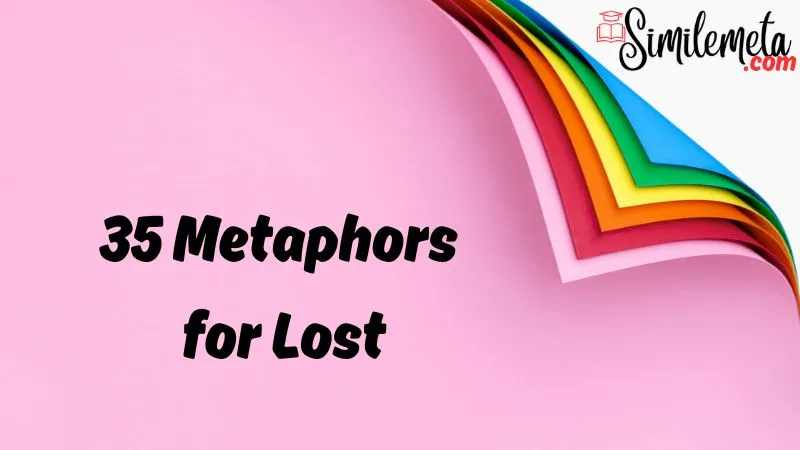Metaphors for lost help us express the confusion, emptiness, or longing we often feel when direction, hope, or a sense of belonging slips away. If describing emotional disconnection, life’s uncertainties, or a drifting identity, these metaphors turn abstract feelings into vivid, relatable images. Whether it’s from wandering through fog or being adrift at sea, these metaphors, in essence, give language to the moments when we feel untethered and unseen.
These comparisons bring depth to writing, helping readers connect with internal struggles. If you’ve ever felt directionless or invisible, these metaphors will speak directly to that experience.
Writers, poets, and lyricists often rely on such expressions to explore personal loss and existential themes. Exploring these metaphors for loss can also help process feelings that are otherwise hard to name.
Metaphors for Lost Examples
Whether it’s emotional fog or wandering without purpose, these metaphors for loss, in turn, vividly capture the essence of disconnection and confusion.
1. Lost in a Dense Fog
Meaning: A fog represents confusion and obscurity, where everything around you is unclear.
Examples in Context:
- “She felt lost in a dense fog, unsure of which direction to take next in life.”
- “His thoughts were like a dense fog, clouding his ability to make decisions.”
2. Lost in the Wilderness
Meaning: In other words, a wilderness symbolizes an unknown, untamed space where one is without clear direction.”
Examples in Context:
- “After the sudden career change, he felt lost in the wilderness, trying to find his way.”
- “She wandered through the wilderness of her emotions, unable to find the path back to happiness.”
3. Lost in a Maze
Meaning: A maze is a complicated, winding path with no easy exit, much like the experience of feeling lost or stuck in life.
Examples in Context:
- “His thoughts swirled in his mind like a maze, leading him in circles without a clear solution.”
- “She felt trapped in the maze of her responsibilities, unable to find a way out.”
4. Lost in the Dark
Meaning: Similarly, darkness represents uncertainty and fear.
Examples in Context:
- “He searched for answers, but was lost in the dark.”
- “She had no idea where she was going, lost in the dark of her doubts.”
5. Lost in the Storm
Meaning: A storm symbolizes chaos and turmoil, representing the inner confusion and struggle.
Examples in Context:
- “After the breakup, he felt lost in the storm, unable to navigate through his emotions.”
- “Her life was in turmoil, and she felt completely lost in the storm of her thoughts.”
6. Lost in a Snowstorm
Meaning: Likewise, a snowstorm is disorienting, with everything obscured by the snow.
Examples in Context:
- “He trudged through the snowstorm of his mind, unable to find any clear direction.”
- “Her goals felt lost in the snowstorm, hidden beneath layers of confusion.”
7. Lost at Sea
Meaning: Being at sea represents being adrift with no anchor.
Examples in Context:
- “She was lost at sea, trying to find a way back to herself after the unexpected changes in her life.”
- “His plans seemed like a boat drifting aimlessly, lost at sea without a clear course.”
Emotional Metaphors for Feeling Lost
When emotions spiral out of control, metaphors help express the depth of feeling lost inside. As a result, these metaphors for lost reveal the silent struggles of confusion, sadness, and inner emptiness.
8. Lost in the Clouds
Meaning: Clouds represent a state of confusion or distraction, where things are unclear and hard to grasp.
Examples in Context:
- “He lost in the clouds of his daydreams, unable to focus on the present.”
- “She lost in the clouds, not knowing what direction she was heading in.”
9. Lost in the Shadows
Meaning: Shadows represent hidden truths and uncertainty, just like feeling lost in a situation where things are unclear.
Examples in Context:
- “His identity lost in the shadows, as if he couldn’t find the real him.”
- “She wandered through the shadows of her past, trying to figure out where to go next.”
10. Lost in the Echoes
Meaning: Echoes represent lingering sounds or feelings.
Examples in Context:
- “Her mind echoed with past regrets, making her feel lost in the repetition of her mistakes.”
- “He tried to escape the echoes of his past, but felt constantly lost in them.”
11. Lost in a Foggy Mirror
Meaning: A foggy mirror symbolizes distortion or unclear vision.
Examples in Context:
- Her future was a foggy mirror—unfocused and hard to see through.
- “His goals were unclear, like trying to look into a foggy mirror with no answers in sight.”
12. Lost in a Desert
Meaning: A desert symbolizes isolation and emptiness.
Examples in Context:
- “He was lost in a desert, thirsty for meaning in his life.”
- “After the argument, their relationship seemed like a barren desert, devoid of connection.”
13. Lost in a Whirlwind
Meaning: A whirlwind represents chaos and unpredictability.
Examples in Context:
- “The sudden changes in her life made her feel like she was lost in a whirlwind, spinning out of control.”
- “His emotions were a whirlwind, and he couldn’t find his bearings, feeling completely lost.”
14. Lost in a Black Hole
Meaning: A black hole symbolizes an inescapable situation, drawing everything into darkness.
Examples in Context:
- He was lost in a black hole, unable to find his way out of the darkness.”
- “The more she thought about her past, the deeper she felt herself being sucked into a black hole of regret.”
15. Lost in a Labyrinth
Meaning: A labyrinth represents a complicated and intricate structure.
Examples in Context:
- “His emotions were a labyrinth, and he couldn’t find a clear way through them.”
- She was wandering through a labyrinth, with no map to guide her out.”
16. Lost in the Void
Meaning: The void represents emptiness and a lack of direction.
Examples in Context:
- “After losing his job, he felt like he was floating in the void, searching for purpose.”
- “Her dreams were lost in the void by the overwhelming pressures of life.”
Metaphors of Direction and Disorientation
In essence, these metaphors for lost capture the experience of wandering through life or making decisions without clear direction.
17. Lost in the Silence
Meaning: Silence represents a lack of direction or communication when nothing around you seems to offer guidance.
Examples in Context:
- “In the silence of the empty house, he felt more lost than ever before.”
- “Her voice was lost in the silence, unheard and unnoticed by those around her.”
18. Lost in Time
Meaning: Time slipping away represents feeling disconnected from the present.
Examples in Context:
- He was lost in time, unable to catch up with the rapid pace of change around him.”
- “Her memories of the past made her feel lost in time, unable to live in the present.”
19. Lost in the Current
Meaning: A current represents something powerful that sweeps you along.
Examples in Context:
- “He felt lost in the current of his responsibilities, swept away by the demands of work.
20. Lost in the Fog of War
Meaning: The fog of war symbolizes confusion and disorientation during conflict, much like feeling lost in a turbulent situation.
Examples in Context:
- The family conflict left him feeling lost in the fog of war, not knowing how to navigate the situation.
21. Lost in a Sandstorm
Meaning: A sandstorm is a disorienting phenomenon.
Examples in Context:
- He felt lost in a sandstorm of responsibilities, unable to see a clear way forward.
- As a result, her thoughts were scattered like sand in a storm, making it impossible to focus on anything.
Quotefliks.com is your new home for meaningful quotes that inspire your day, lift your mood, and touch your heart.
22. Lost in the Darkness of Night
Meaning: The night represents a time of uncertainty and fear.
Examples in Context:
- “The long hours of isolation made her feel like she was walking in the darkness of night, blind to the future.”
23. Lost in the Tides of Life
Meaning: Life’s ever-changing tides symbolize being carried away by circumstances.
Examples in Context:
- “She found herself adrift, lost in the tides of life, unsure where the waves would take her next.”
Metaphors About Identity and Self-Loss
In these moments, metaphors for loss delve into the experience of feeling disconnected from your identity or sense of purpose.
24. Lost in the Storm Clouds
Meaning: Storm clouds represent an impending sense of danger or difficulty.
Examples in Context:
- “She lost in the storm clouds of her emotions, unable to see a way through the chaos.”
25. Lost in a Whirlpool
Meaning: A whirlpool symbolizes a powerful force pulling you in.
Examples in Context:
- “The pressure of his career was like a whirlpool, and he felt helpless.
- “Her worries kept pulling her in, as if she were lost in a whirlpool of anxious thoughts.”
26. Lost in the Abyss
Meaning: The abyss represents a vast, infinite void.
Examples in Context:
- He felt like he was lost in the abyss, unable to find a way out of the sorrow.”
- “Her dreams seemed distant, lost in the abyss of her uncertainty about the future.”
27. Lost in a Tunnel
Meaning: A tunnel represents a long and narrow path.
Examples in Context:
- “He felt like he was lost in a tunnel, with no light to show him where to go.”
- “The endless challenges seemed like a tunnel, and she felt hopelessly lost inside it.”
28. Lost in a Forest of Confusion
Meaning: A forest represents an overwhelming maze of obstacles and choices.
Examples in Context:
- “She was lost in a forest of confusion, unable to make sense of her thoughts or feelings.”
- “The more he tried to figure it out, the deeper he felt he was lost in the forest of uncertainty.”
29. Lost in a Hurricane
Meaning: A hurricane represents a violent, uncontrollable force.
Examples in Context:
- “Her emotions were like a hurricane, pulling her in every direction and leaving her feeling lost.”
Literary Metaphors for Lost
For centuries, writers and poets have crafted powerful imagery to portray the feeling of being lost. As a result, these metaphors for loss bring elegance and depth to emotional storytelling.
30. Lost in the Labyrinth of the Mind
Meaning: Similarly, the labyrinth of the mind symbolizes a complex and intricate network of thoughts and emotions, where one often feels lost within their mental processes.
Examples in Context:
- His anxiety trapped him in the labyrinth of his mind, unsure of how to find peace.
- “She wandered through the labyrinth of her mind, unable to make sense of her overwhelming thoughts.”
31. Lost in the Fog of Uncertainty
Meaning: Fog represents a state of lack of clarity.
Examples in Context:
- She reached a crossroads in her career and found herself lost in the fog of uncertainty about her future.
32. Lost in a Web of Lies
Meaning: A web of lies represents an entangled and complex situation.
Examples in Context:
- “He felt trapped, lost in a web of lies, unable to distinguish truth from fiction.”
- The lies he told to protect himself wove a web of confusion, and as a result, he now found himself completely lost.
33. Lost in the Sands of Time
Meaning: In this context, the sands of time represent the inevitable passage of time.
Examples in Context:
- “As the years went by, he felt like he was lost in the sands of time, unable to reclaim his past.”
- “She couldn’t hold on to the memories, as if they were slipping away, lost in the sands of time.”
34. Lost in the Twilight
Meaning: Likewise, twilight blurs the line between day and night, actively symbolizing the uncertainty and confusion of being caught between two places or states.
Examples in Context:
- “She stood at the edge of the unknown, lost in the twilight between what was and what could be.”
- “His heart was caught in the twilight, unsure if he was moving forward or backward in life.”
35. Lost in the Whirlpool of Emotions
Meaning: A whirlpool of emotions represents overwhelming feelings that pull a person in all directions.
Examples in Context:
- “Her emotions were a whirlpool, and she couldn’t find her way out of the overwhelming feelings.”
36. Lost in the Fog of the Past
Meaning: In many cases, the past clouds one’s perspective, symbolizing the feeling of being lost when stuck in old events or memories.
Examples in Context:
- As a result, he couldn’t move forward, lost in the fog of the past and constantly revisiting old regrets.
- Her memories trapped her, pulling her into a fog where she felt lost and unable to escape the grip of her past.
37. Lost in a Sea of Choices
Meaning: Similarly, a sea of choices overwhelms the mind, clouds decision-making, and ultimately leads to a deep sense.
Examples in Context:
- As a result of the endless possibilities, she was lost in a sea of choices, unsure of which one to make.
- “He was drowning in a sea of choices, unsure which path would lead him to success.”
Fill in the Blank: Metaphors for Lost
Complete each sentence with the most fitting metaphor:
- After the breakup, she felt like a ____________________, drifting without direction or purpose.
- His thoughts were clouded, as if lost in a thick ____________________ of doubt and regret.
- Without his art, he felt like a ____________________, unsure of who he was anymore.
- She wandered through life like a ____________________, following paths that led nowhere.
- His identity felt like a ____________________, flickering and unstable in the face of pressure.
- With no sense of belonging, he was a ____________________, moving but never arriving.
- In the storm of emotions, she was like a ____________________, overwhelmed and invisible.
- He stared at the blank page like a ____________________, lost for words and purpose.
- Without guidance, she became a ____________________, unable to make sense of the world around her.
- Their love was a ____________________, fading slowly with no direction home.
Answer Key
- boat without a sail
- fog
- shadow of himself
- traveler with no map
- candle in the wind
- ghost in a crowd
- leaf in the wind
- ship without a compass
- child in the dark
- road with no end
Conclusion
Metaphors for lost capture the deep emotions of confusion, isolation, and searching that we all experience at times. If it’s feeling like a ship without a compass or a traveler without a map, these vivid comparisons help express what words alone often cannot. Ultimately, they remind us that being lost is part of the journey—and sometimes, it’s how we eventually find ourselves.
These metaphors for loss give voice to our quietest struggles. Moreover, by naming our lostness, they gently guide us toward clarity and connection.”
Ultimately, they show that even in moments of uncertainty, there is beauty in wandering; after all, every lost path holds the promise of discovery.




